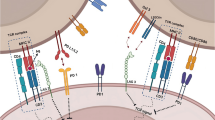Abstract
Patients with advanced malignant disease show an apparent lesser degree of lymphocyte sensitization to cancer antigen when tested under standard conditions than do early cases. In the serum of cancer patients there is a lymphocyte response depressing factor whose titre rises as the neoplasm becomes more extensive. The low lymphocyte response shown by advanced cancers is not, however, directly referable to this rise in depressive factor, but to removal by the tumour mass of specifically sensitized lymphocytes so that amongst the standard number of cells under routine test an adequate number does not remain to give a full response. Increasing the number of cells under test restores the result to the level found in moderately sized cancers. The “absorptive capacity” of large tumours for circulating sensitized lymphocytes is greater than can be provided by natural immunization produced by the tumour. Active immunization with a tumour antigen can be expected therefore to increase lymphocyte-associated defence against cancer.
Similar content being viewed by others
Rights and permissions
About this article
Cite this article
Field, E., Caspary, E. Lymphocyte Sensitization in Advanced Malignant Disease: A Study of Serum Lymphocyte Depressive Factor. Br J Cancer 26, 164–173 (1972). https://doi.org/10.1038/bjc.1972.23
Issue Date:
DOI: https://doi.org/10.1038/bjc.1972.23
- Springer Nature Limited
This article is cited by
-
Macrophage electrophoretic mobility(MEM)test in malignant gynaecological diseases
Archiv f�r Gyn�kologie (1976)
-
Immunchemische Untersuchungen zum Problem der ?pregnancy zone? X. Nachweis immunsuppressiver Aktivit�ten des schwangerschaftsassoziierten? 2-Glykoproteins (Protein der ?pregnancy zone?) mit Hilfe des Makrophagen-Elektrophorese-Mobilit�tstestes
Archiv f�r Gyn�kologie (1975)
-
Zur Anwendung und Bedeutung des Makrophagen-Elektrophorese-Mobilit�ts-(MEM)-Testes bei neurologischen Erkrankungen
Klinische Wochenschrift (1974)




